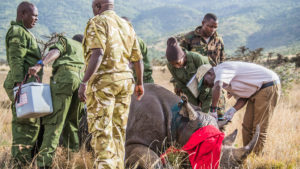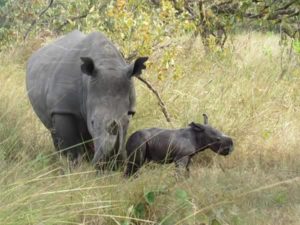Elewana Lewa Guests Witness Rhino Notching
March 31, 2018 - 3 minutes read Lewa Wildlife Conservancy and the Kenya Wildlife Service (KWS) recently teamed up for a rhino notching exercise during which Elewana Lewa Safari Camp guests were able to witness this vital conservation exercise in person.
Lewa Wildlife Conservancy and the Kenya Wildlife Service (KWS) recently teamed up for a rhino notching exercise during which Elewana Lewa Safari Camp guests were able to witness this vital conservation exercise in person.
Notching involves creating a unique pattern on the ears of the rhinos that enables rangers to identify and keep track of the animals during anti-poaching patrols and record accurate and consistent data on each animal.
Aiming to ear notch at least 20 rhinos in six days on the Lewa-Borana region, this was a massive exercise. Subira — a three-year-old black rhino — was the first to get a notch pattern, followed by three others on the first day.
Lewa guests watched the notching and certainly learned a great deal when it comes to the conservation work that goes on at Lewa Wildlife Conservancy and the daily fight to protect these incredible animals.
Rhino notching is part of the conservancy’s initiative to protect and manage wildlife species, a campaign that also includes support for community conservation and development programs and the education of local youth in the value of wildlife.
Lewa has reversed a decline in several endangered species, particularly the rhino. Since 1984, its rhino population has grown steadily, not only restoring local numbers but enabling the reintroduction of black rhinos into regions where they had long been extinct.
The Conservancy currently harbors more than 10 percent of Kenya’s black rhinos and 15 percent of the nation’s white rhino population. For three years, not a single rhino has been poached in the conservancy.
As part of the effort, Lewa has created a new Joint Operations Center, which serves as the communications hub for the entire area, embracing Borana to the west and all the Northern Rangeland Trust Conservancies. This covers an area with a radius of about 300 square kilometers. The launch of this center allows operators to see  exactly what’s happening across the vast expanse of north-central Kenya in real time.
exactly what’s happening across the vast expanse of north-central Kenya in real time.
Vulcan, the high-tech and philanthropy-focused company founded by Paul G. Allen, created the new system specifically to help combat poaching and enhance wildlife management on a large scale across a vast area.
Called the Domain Awareness System (DAS), the program integrates data and technology to provide a single picture that instantaneously alerts security and anti-poaching teams to threats and supports real-time tactical decision making.
0 Comments